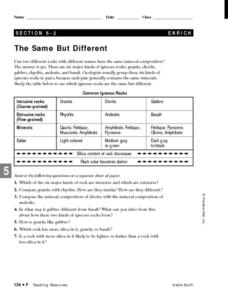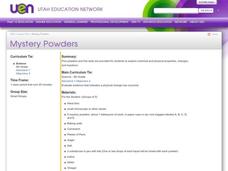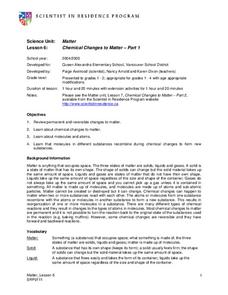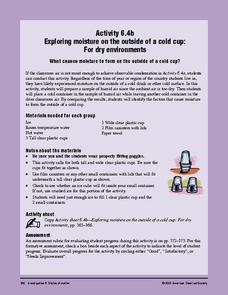Curated OER
Chemical Changes
Eighth graders observe two types of interactions in a sealed plastic bag. One bag contains baking soda and water, and the other baking soda and vinegar. They determine what evidence indicates that a chemical change is occurring.
Center for Learning in Action
Water—Changing States (Part 1)
Here is part one of a two-part lesson plan in which scholars investigate the changing states of water—liquid, solid, and gas. With grand conversation and up to three demonstrations, learners make predictions about what they think will...
Center for Learning in Action
Introduction to the States of Matter
Liquids, gases, and solids are the states of matter in which scholars investigate in a lesson plan that offers in-depth information and engaging activities that look into the three states and the changes their properties make when mixed...
Department for Children, Schools and Families
Explaining Change Processes Using a Simple Particle Model of Matter
The more things change, the more they stay the same. This unit includes seven lessons starting with physical change and moving through to chemical change. Conservation of matter is explained clearly with multiple hands-on activities and...
Scholastic
Study Jams! Solids, Liquids, Gases
Your physical science class learns that there are three states of matter, and that adding or removing heat can cause it to change from one state to another. By the animations, printed information, and discussion between RJ and Zoe, they...
Columbus City Schools
What’s Up with Matter?
Take a "conservative" approach to planning your next unit on mass and matter! What better way to answer "But where did the gas go?" than with a lab designed to promote good report writing, research skills, and detailed observation. The...
Curated OER
The Same, But Different
Third graders examine the phase change between solids and liquids and determine it to be a physical change. Ice is the perfect item to use to demonstrate this phase change. Pupils experiment with measuring and weighing solid ice and the...
Curated OER
Physical and Chemical Changes in Matter
Students investigate chemical and physical changes. In this chemical and physical changes lesson plan, students distinguish between a chemical and physical change when observing baking bread and hot dogs and bagels cooking on a grill....
Curated OER
Mystery Powders
Fifth graders evaluate the physical properties of 5 powders. Each powder is subject to different conditions. They describe each observation as with a chemical change or a physical change.
Curated OER
Matter
Students recognize that some changes to matter are reversible and some are not. In this matter lesson, students experiment a physical and chemical change. Students record experiment results in their science journals. Students act out...
Curated OER
Chemical or Physical Change?
Eighth graders participate in several science activities to note chemical or physical changes after discussion. They understand that all matter has definite structure which determines physical and chemical properties.
Curated OER
Matter - Chapter 2 Physical Changes
In this matter worksheet, students identify words and match them to their definition. Students identify words dealing with matter, its physical changes, and the effect of heating and cooling matter. This worksheet contains nine...
Curated OER
Changing States: Does it Matter
Students participate in experiments to visualize the differences between chemical and physical changes. They attempt to detect the five characteristics of a chemical change.
Curated OER
Physical and Chemical Changes
Students observe examples of physical changes that can take place between the three states of matter and develop common sense and intuition in distinguishing between chemical and physical changes. They observe diagrams on the board from...
Curated OER
Three States of Matter
Third graders investigate the three states of matter and the properties of materials as they undergo physical changes. They identify examples of each type of matter, role-play atoms in solids, liquids, and gases, and conduct an...
Curated OER
Properties of Matter
In this properties of matter worksheet, high schoolers answer 6 questions related to matter. They classify and categorize given statements as chemical or physical properties, they identify chemical and physical changes and they find the...
Curated OER
Ready, Set, Let's Dough! It's a Matter of System
Students explore physical sciences by participating in a class experiment. In this matter instructional activity, students identify the three forms of matter and their physical differences. Students utilize cookie dough to create a play...
Curated OER
Unit 1 Matter and Energy
Topping this worksheet is a comprehensive collection of notes about phase changes. The phase change graph is displayed, along with formulas for the gas laws, and information relating energy to change of phase. After reviewing these...
Curated OER
What Do Your Know About Matter?
Perfect for 1st grade students, this presentation contains information on the various states of matter, what affects them, and how they change. Using clear language and simple images, these slides will be there to guide any lesson or...
American Chemical Society
From Gas to Liquid to Solid
From gas to liquid condensation to solid frost, water undergoes phase changes before students' eyes! Using ice, salt, water, and a metal can, they set up an investigation that can be used in a physical science setting, or as part of a...
American Chemical Society
Evaporation
This is one in several lessons that explore the relationship between temperature and phase changes of water. After some discussion, elementary physical scientists place wet paper toweling on a hot and a room-temperature water bag and...
American Chemical Society
Condensation
It's time to break the ice! If you are doing all of the lessons in the unit, children have already seen that increasing heat increases the rate of evaporation, but is the opposite true? Does decreasing temperature cause more condensation...
American Chemical Society
Exploring Moisture on the Outside of a Cold Cup: For Dry Environments
If the area you live in is arid, or the preceding experiment in this unit didn't yield obvious results, use this one in place of it to help reveal where condensation comes from. The mini unit that this is part of a comprehensive...
Urbana School District
Fluids
In 1879, Sir William Crookes discovered the fourth state of matter, plasma. The presentation covers states of matter, phase changes, density, pressure Pascal's Principle, buoyant force, Archimedes' Principle, Bernoulli's Principle,...

























